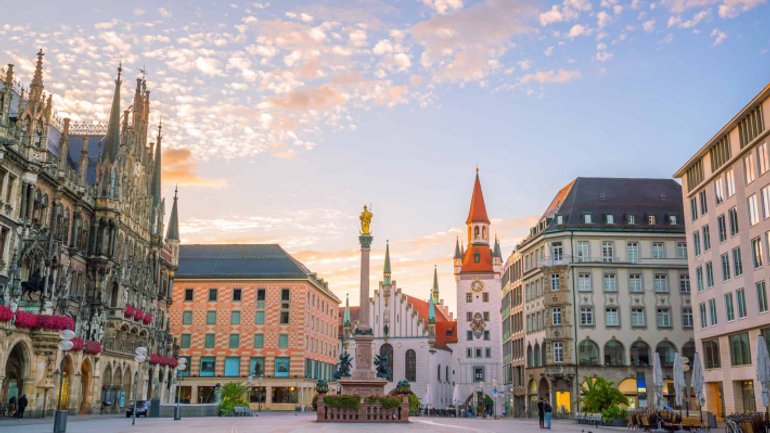Interest in the UGCC remains unabated in Germany and Scandinavia," - Chancellor of the Apostolic Exarchate

According to him, the enthronement, due to increased quarantine measures, will take place with a minimal presence of clergy and faithful – there will be only representatives of the Church and state. The enthronement will be performed by the head of the UGCC, His Beatitude Sviatoslav, who has already arrived in Munich.
Germany is a country that has harbored the Ukrainian diaspora for a long time: the first wave of emigration in the 20s of the XX century. The second wave of emigrants from Ukraine – emigrants after World War II, the so-called DPs -displaced persons from labor and concentration camps in Germany. Since then, Hamburg has had one of the oldest communities of Ukrainian Greek Catholics and the Church of All Saints, the construction of which was initiated by patriarch Iosyp Slipyi in 1969. The consecration of the church took place in 1980. The third wave started in the 90s and continues to this day.
"The UGCC has several churches of its own, which date back to the beginning of pastoral care in Germany – in New Ulm, Munich, Bamberg, Hamburg," says Fr. Dymytryk. "There are communities everywhere, bigger and smaller, but there are almost no communities that would freeze: even if the community is small, it is still active."
In 1959, by decree of Pope John XXIII, the Apostolic Exarchate of the UGCC was established in Germany and the Scandinavian countries with a cathedral in Munich – the Cathedral of the Intercession of the Most Holy Theotokos and St. Andrew the First-Called. For more than forty years, the Apostolic Exarch in Germany was Bishop Platon Kornelyuk, and since 2001 – Bishop Petro Kryk.
"Ten years ago in Germany, the majority of Ukrainians were from that older generation, but now the situation has completely changed: now the majority are emigrants of the 90s, who have a different vision and perception of many things," says Father Andriy Dmytryk.
Father Andriy says: there are 75-77 thousand Greek-Catholic Ukrainians in Germany. Although according to the latest data, there are much more Ukrainian emigrants (more than 240 thousand). The new wave of migration that began in the 90s and continues to this day is mainly young people born in Ukraine and who went to study and work. That is, these are people who have a different worldview than emigrants of previous waves. And now they constitute the basis of both Ukrainian emigration and the UGCC community.
"It is interesting that over the past seven years, after the beginning of the Russian-Ukrainian war in the East and the occupation of Crimea, people from Crimea, the East and the center of Ukraine are increasingly coming to us," notes Fr Andriy. "Because earlier it was possible to say that the UGCC in Germany is the local Galicia, but now it is not. And this is great and good news for us."
Currently, there are 55 UGCC communities of various levels in Germany. Active priests are 26 together with Scandinavia. Most of them serve in 2-3 communities.
In the Scandinavian countries, over the past 5-7 years, there has been a significant increase in the emigration of Ukrainians – these are mainly young people who go to study and work. In some Scandinavian countries, there have long been priests of the UGCC performing their ministry on a regular basis: one each in Norway and Denmark, two in Sweden. But some countries have not. So, in Finland, on the direction of the pastoral and Migration Department of the UGCC, a priest from Estonia is coming. Iceland, which joined the Exarchate relatively recently, in the 80s, also does not have its own priest. Moreover, there is a need for it.
"Perhaps it will be one of Bishop Bohdan's first priorities to have our priest in Reykjavik," says Fr. Andriy. "Iceland has a fairly active Ukrainian community, which is about 200 people, and as far as I know, there is both potential and opportunities for the approval of the UGCC."
The language of the Liturgy in the churches of the UGCC in Germany is mainly Ukrainian, unlike in other diaspora countries, where services are performed 50/50 in the languages of the host countries.
"The main reason: people who come to the service of God are Ukrainians who want to feel at least a little at home through the language of the Liturgy, next to their parents, friends, and Homeland," says Fr Andriy. - But I know parishes where there are people who, not being Ukrainians, speak Ukrainian fluently and want to hear the service in Ukrainian: they like and are close to our liturgy, our Rite. This is also the case in the Scandinavian countries: in every parish or community, there are people who are really and sincerely interested in our Rite, language, culture. that is, there is interest in the UGCC, and it does not subside," the chancellor said.









